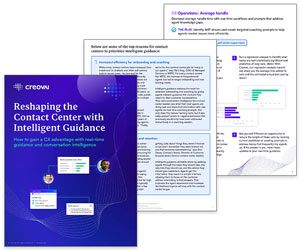Paul Clark believes that the essence of delivering great customer service can be distilled into ten key areas.
1. Effective customer intelligence
One of the issues we come back to time and time again with our blue-chip clients is not working out how best to interact with customers – but how to figure out who those customers actually are in the first place! Developments like loyalty cards and the internet have certainly made it easier to track customers and their buying habits – but it is still a huge challenge for companies. Effective customer intelligence is based on three essential questions: Who are our chosen customers? What do they need and expect from us as a service provider? How are we doing in meeting their needs?
2. Have faith in your front-line customer service staff
It is people that deliver great service, not companies. Some of the best customer service is delivered by companies which empower their customer service agents to think for themselves, act independently and be flexible. Nothing annoys customers more than a centre agent who is completely unable to deviate from an obviously pre-prepared script.
3. Understand how customers think
Few firms have begun to consider how they can test for the emotional elements of the customer experience. This is where Enterprise Feedback Management comes in – proactively surveying customers when they are likely to have experienced a service issue (i.e. a water company surveying a group of customers where a leak has occurred in their area would be a classic example) enables companies to plug into their customers’ experiences and resolve issues before the relationship breaks down.
4. Work for and with people who believe in service excellence
If the people at the top of an organisation don’t believe in service excellence, it won’t happen. Customer service has to be an issue that the board takes seriously. If it’s not, all the money in the world won’t give you a decent customer service operation.
5. Master the art of organisation design
Service excellence is a function of how the organisation is designed. Its key elements are what the leaders do and how effective the management processes are in facilitating the desired outcome. This is particularly obvious in the area of customer complaints. How are complaints handled? Are they treated as a priority and sorted according to urgency? Or are they chucked in a pile, to be dealt with as and when possible?
6. Make the link to the bottom line
Masters of service excellence understand that customers who have a great experience are more likely to continue to buy from their companies and more likely to recommend them to others. They also understand that even customers that complain can become brand advocates – if their complaint is resolved quickly and satisfactorily.
7. Make everything a little better every day
Leaders in service excellence train their people to drive continuous improvement. Companies which settle for a set level of service – even if it’s good – will inevitably fall behind the competition over time.
8. Understand that the future will be different
Technology is changing the way service is delivered all the time. Failing to grasp the opportunities and threats presented will mean failure. In customer service, webchat, email, SMS, and Enterprise Feedback Management are just a few of the technologies changing the landscape significantly.
9. Learn from your mistakes
Everybody makes mistakes, but winners learn from them, giving their front-line people as much freedom as possible to fix problems. When individuals or teams make mistakes, use them as opportunities to learn. A customer service charter is a great idea – but a willingness to change and develop your customer service strategy based on feedback from your customers and changing market conditions is even better.
10. Make things easier for customers
Too many firms still make buying and dealing with the customer service department unnecessarily difficult – for both retail and business customers – with unclear pricing, long delivery times, insufficient information and poor support and service. Customer patience is limited – and is only likely to become more constrained in our cash-rich, time-poor society. But for those companies that get it right, the prizes are immense.
Paul Clark is the CEO of Charter UK (www.charter-uk.com)
Author: Jo Robinson
Published On: 5th Nov 2008 - Last modified: 9th May 2018
Read more about - Hints and Tips, Customer Service




















Here at our contact centre we run a 2 day programme (and follow up workshops) looking at service excellence. In this session we look at Emotional Intelligence (linking different caller ‘styles’ to words and phrases to give the best customer experience, learning how we can recognise those ‘styles’and adapting our own ‘style’ to suit.
Great list. I particularly appreciate “have faith in your front line customer service staff”. To me, having that faith involves providing consistent training and motivation to them, not just in the key work processes, but also communication skills, empathy, handling strong emotion with customers. This way we are consistently building excellence, monitoring progress and providing powerful feedback.
Everyone knows that customer service is vital, but lots of firms still address
the task haphazardly. Customer service comes at that point when customers
are highly engaged in the problems they have. “So it’s always a difficult and
important period for the company as business totally depends upon the
customer satisfaction”. Still having these all problems Call Centers agents
are trying to give the proper reply to the customer queries . C E O as well a
management of the call centers are also trying to give as much facilities to
their employees so that they can give proper satisfactory to the customer
queris by maintaining their quality . Growth of call centres are totally
dependable upon the customer satisfaction
thank you very much for the great customer service tips. they are a big help to me because I work as a live chat operator doing customer service job.
two thumbs up!
Let me quote: “Nothing annoys customers more than a centre agent who is completely unable to deviate from an obviously pre-prepared script.”
I work as live chat operator and when I was still a newbie operator I had a hard time deviating from canned messages.
¡Muchas gracias!
Me sirvió mucho.
🙂
I believe this is an excellent website for tips which are necessary to get a insight in to fantastic customer service, and the information contained within it extremely uesful.